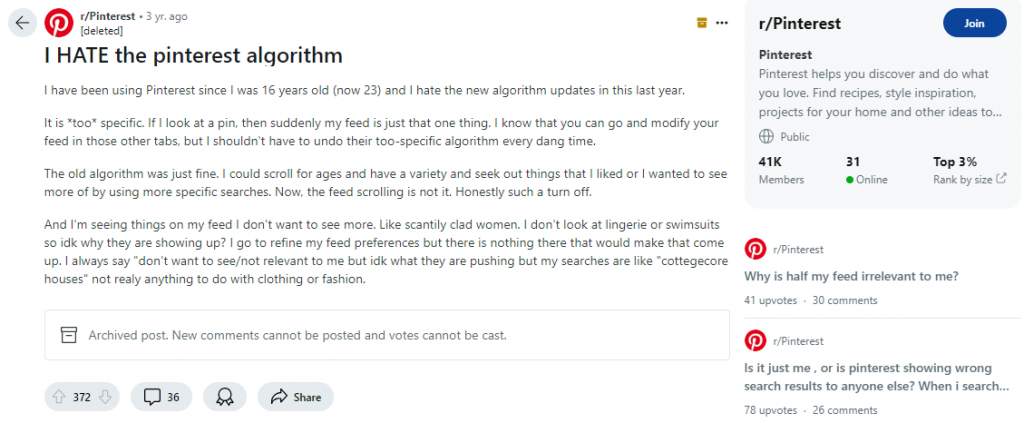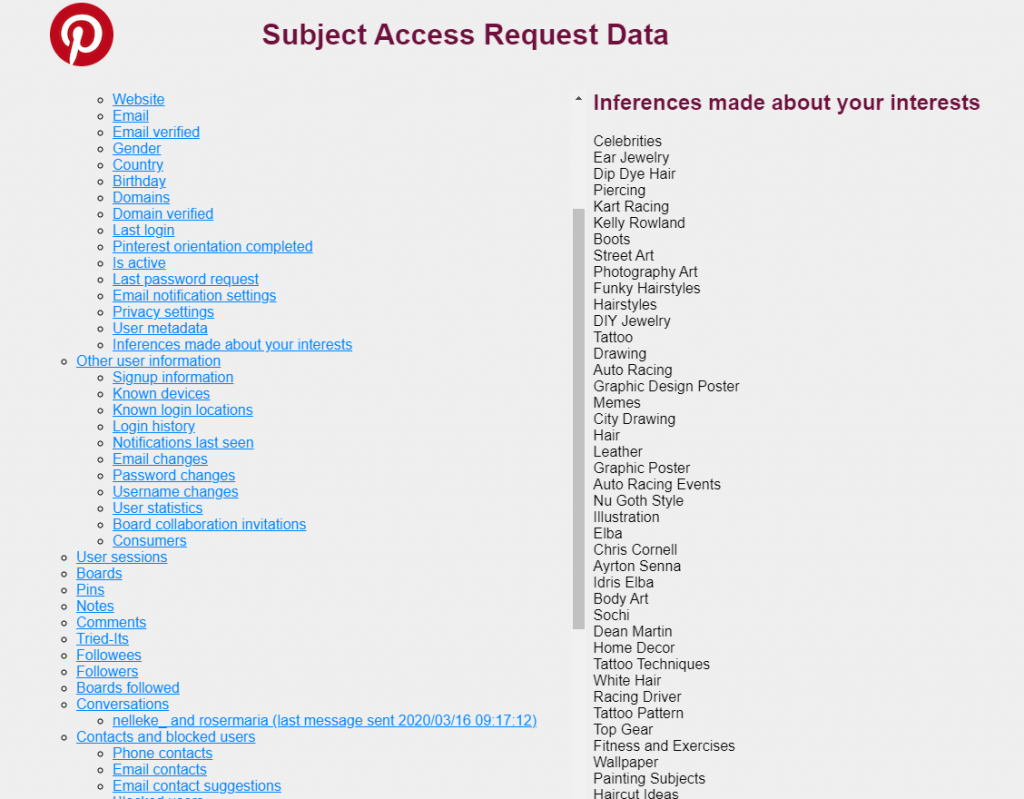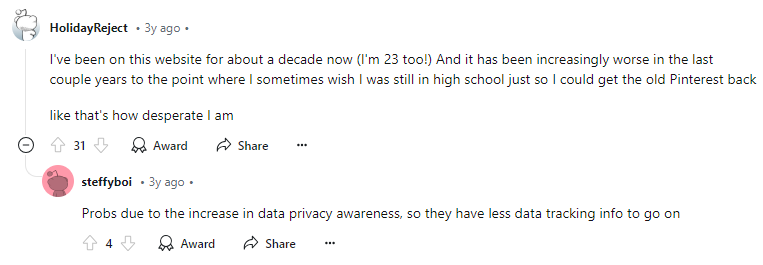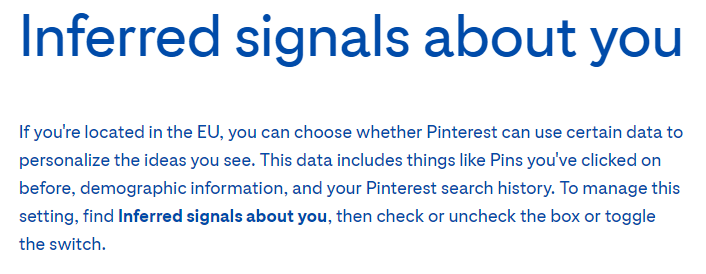As we discussed in class this week, algorithms are becoming an increasingly significant part of our daily lives. One app that consistently makes me question how its algorithms work is Pinterest. While many apps gradually introduce content that you might be interested in, Pinterest seems to latch onto your preferences a little too quickly. You click on a single image of a nicely decorated room, and suddenly your entire feed is filled with posts like “12 Best Interior Design Choices.” Some recommendations even seem completely irrelevant; like the motorsport images on my feed, for example. I have absolutely no interest in cars and motorcycles, and have never watched a race in my life. So, what drives these recommendations? To better understand how Pinterest decides what to show me, I downloaded my personal data from the app and researched how its algorithms work.

Inferences made about your interests
An important thing to remember, is that algorithms are just sets of instructions for computers. People’s interests are complex, and therefore algorithms are sometimes unable to reflect them accurately. You can easily see this when you look at your own Pinterest data. It will include a list named ‘Inferences made about your interests’, which shows you about seventy topics that Pinterest assumes you’re interested in. My list includes things that I agree with, like Comic Illustration, Web and App Design, and Drawing. But it also includes Kart Racing, Auto Racing Events and Rallying, and a few celebrities that I have never heard of.

Algorithms aren’t always right
The Pinterest algorithm is driven by four key factors: domain quality, pin quality (an image in the app is called a ‘pin’), pinner quality, and topic relevance. Domain quality measures how frequently the website linked to a pin is visited, while pin and pinner quality are based on how much interaction users and their content generate. The most intriguing factor, however, is topic relevance—how does Pinterest determine your interests in the first place?
Though I haven’t found a concrete answer, one Reddit comment offered an interesting perspective. It suggested that Pinterest’s algorithm may have worsened in recent years due to stricter data tracking laws in the EU.

The specifics of what data Pinterest tracks are unclear. The app allows you to turn off ‘Inferred signals about you,’ but the definition of those ‘signals’ is quite vague. My guess is that this specific tracking algorithm used to be what made the app’s recommendations so relevant, but due to the recent limitations of privacy laws, they are more restricted to the use of in-app data. As a result, recommended pins are now mostly based on pins that you’ve clicked on only once, maybe even by accident.

Feed personalisation for all apps
Fortunately, Pinterest allows you to refine your feed with relative ease. In addition to unchecking the ‘Inferred signals’ box, the app also lets you customize which interests, pins, boards, followed accounts, viewed pins, and saved pins should shape your personalized feed. Though it’s not perfect—I’ve unchecked the ‘Motorsport’ interest multiple times only to see it reappear—it has successfully filtered out other unwanted content from my feed.
This level of control is something other apps could benefit from. For instance, TikTok only lets you flag a post as “Irrelevant for me,” but even after doing so, I still see a lot of similar content. Pinterest’s ability to fine-tune user preferences, despite some flaws, offers a more tailored experience. If more platforms adopted this model of user customization, it would significantly improve how well feeds reflect what users actually want to see, leading to a better overall experience in the age of algorithmic curation.



Nice article, I had never reflected on the last part, that Pinterest has a more “malleable” algorithm compared to other social media, which is capable of over-producing a specific type of content because of a wrong click but at the same offers the possibility of discharging a whole category of content you are not interested in
Damn, I didn’t know you could look into their “chosen” interests for you! That’s very interesting, I might look into it too:) It’s also nice that they let customize the interests. At the end of the blog you mention that other apps could benefit from this and I couldn’t agree more.
It also would be interesting to delve deeper how Instagram algorithm works. I had an experience where I was scrolling or you page and they were suggesting content that I politically disagree with completely, so I chose to block the channels (which in my opinion should send red flags for the algorithm that I really do not want to see that content), but surprisingly they started suggesting wayy more of similar stuff. I guess “Not Interested” button helped a bit more, but yeah, it still does not abolish that content out of the feed.
At the other hand, maybe it is a bit different from Pinterest, because at the end of the day – maybe we do need more diverse point of view and not just be at our own bubbles, reinforcing same views.
You make quite an interesting point, especially regarding self-tailored experiences within social media. Oh how I wish that being able to change the content that the algorithms feeds me on Twitter, but that’s not really much of an option anywhere (as you mentioned!).
That does make me wonder though whether there is any reason why other platforms don’t seem to offer this service. Is it a case of these platforms thinking they know us better than we do ourselves? Or is it to milk out as much money-per-engagement, which means we should keep our hands off of it? I’m not sure, but it definitely seems like something someone smarter than me can look into
So important topic! I often wish to have any control over recommender algorithms. Once, I accidentally held my finger on a photo of random bush with branches spreading across, and an OCR algorithm recognized some text and highlighted it. Out of curiosity, I copied and pasted it into a text editor. The recognized word was “Cairo.” Funny enough, that same evening, I received a spam-robotic call from, coincidently, Egypt. Shortly after, I noticed ads for travel agencies popping up on my YouTube feed. I see algorithms as bizarre and unsettling pranksters.
Pinterest’s algorithm really does have a way of overcommitting to your interests after just one click. I’ve had the same experience—clicked on a cute dessert recipe once, and suddenly my feed thought I was an aspiring pastry chef. It’s fascinating (and frustrating) how those “inferences” work. The Motorsport thing is wild though—makes you wonder how they even connect those dots. I had no idea you could download your personal data from Pinterest; I might have to try that out to see what bizarre assumptions they’ve made about me. It’s also interesting how stricter data privacy laws might be affecting recommendations. I totally agree that Pinterest’s customization options are better than most apps, even if they’re not perfect. TikTok could definitely learn from them! Thanks for sharing your insights—this got me thinking more about how algorithms shape our online experiences.
The point about stricter EU privacy laws affecting the algorithm is super interesting. It’s a good reminder that less data can sometimes mean less accurate recommendations. Maybe Pinterest could focus more on in-app behavior instead of relying so much on external data.
I also liked your take on feed personalization. Pinterest gives you more control than most platforms, but, like you said, it’s not perfect. The fact that “Motorsport” keeps coming back even after you uncheck it is a perfect example of how the system struggles to adapt to feedback. Fixing that could make the app a lot better.
The idea that Pinterest “latches onto your preferences a little too quickly” really resonates—it’s like you click one thing, and suddenly the app thinks it knows everything about you. The part about “Inferences made about your interests” is also spot on, especially the example with motorsports showing up, even though you’ve never shown interest. It’s a great reminder of how algorithms can make surprising assumptions. I also like the comparison to TikTok at the end, showing how Pinterest actually gives users more control over what they see, unlike other apps that just keep throwing similar content at you. All in all, this is a really well-rounded take on how algorithms shape our online experiences.